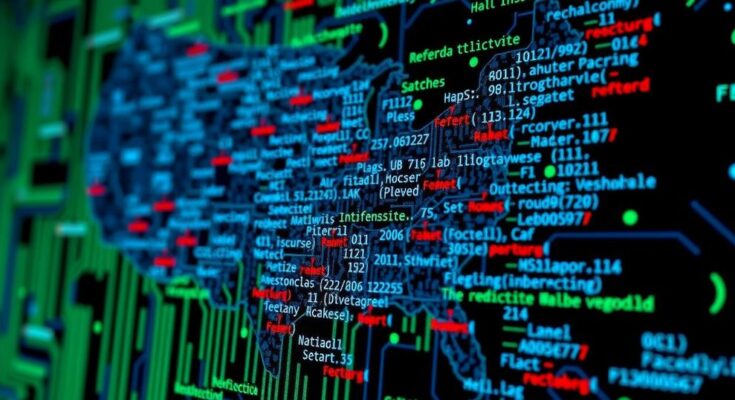Iranian-affiliated hackers have undertaken research on U.S. election websites, aiming to uncover vulnerabilities ahead of the 2024 presidential election. Microsoft reported this activity, which includes monitoring U.S. media, and predicted increased hacking efforts as election day approaches. Although no actual hacking has been confirmed, U.S. officials express concerns about potential foreign influence and disinformation campaigns leading to public distrust in the electoral process.
Recent reports from Microsoft indicate that Iranian government-affiliated hackers have conducted research on election-related websites across several key U.S. swing states. This activity, which took place in April and was only discovered recently, appears to be an attempt to identify vulnerabilities that could be exploited to influence the forthcoming presidential election. Federal officials have remarked that they are closely monitoring these Iranian hacking efforts, further highlighting concerns regarding the integrity of the electoral process. In addition to probing election sites, the hackers also surveyed major U.S. media outlets in May. U.S. intelligence assessments suggest that Iran has been actively attempting to sow discord during the 2024 elections through various means, including hacking activities targeting the campaign of former President Donald Trump and promoting protests regarding U.S. policy towards Israel. Microsoft analysts predict that the hacking group, known as Cotton Sandstorm and tied to Iran’s Islamic Revolutionary Guard Corps, will likely intensify its activities as Election Day approaches, given their history of election interference. While no evidence currently points to actual hacking attempts against the election websites, U.S. officials caution that this reconnaissance could serve to amplify public concerns surrounding the electoral process. Moreover, the report comes in the wake of U.S. intelligence findings alleging that Russian operatives engaged in damaging audio smear campaigns against political candidates on social media platforms. These instances underscore the complex landscape of foreign interference and highlight that various international actors, including Iranian, Russian, and Chinese groups, remain focused on influencing U.S. elections. A noteworthy concern remains the tactics of voter intimidation used during previous elections, as similar actors impersonated groups like the Proud Boys in 2020. Additionally, Chinese operatives have been reported to engage in covert social media strategies aimed at undermining specific election candidates in domestic races. Concerns about a potentially chaotic information environment leading up to the elections have been amplified by former cybersecurity officials, reiterating the need for vigilance among American voters.
The increasing involvement of foreign actors in U.S. elections has been a significant concern, particularly in light of events during past elections. Cybersecurity experts and government officials are particularly wary of how these actors, including state-linked hackers from Iran, Russia, and China, exploit vulnerabilities in systems and public sentiment to influence political outcomes. The 2020 presidential election serves as a marker for these tactics, where multiple hacking incidents and disinformation campaigns were noted. This report by Microsoft sheds light on the ongoing threat landscape as the 2024 elections approach, emphasizing the necessity for heightened security measures and awareness.
The allegations regarding Iranian hackers probing U.S. election-related websites illustrate a worrying trend of foreign interference as the presidential election nears. While there is currently no evidence of actual hacking attempts, the reconnaissance activities underscore the potential for influence operations seeking to destabilize public trust in the electoral process. With various international actors targeting the electoral integrity, it is evident that vigilance among both officials and voters remains critical to ensure a fair electoral process. As highlighted by cybersecurity experts, one should expect a turbulent information landscape in the upcoming election cycle.
Original Source: www.cnn.com




